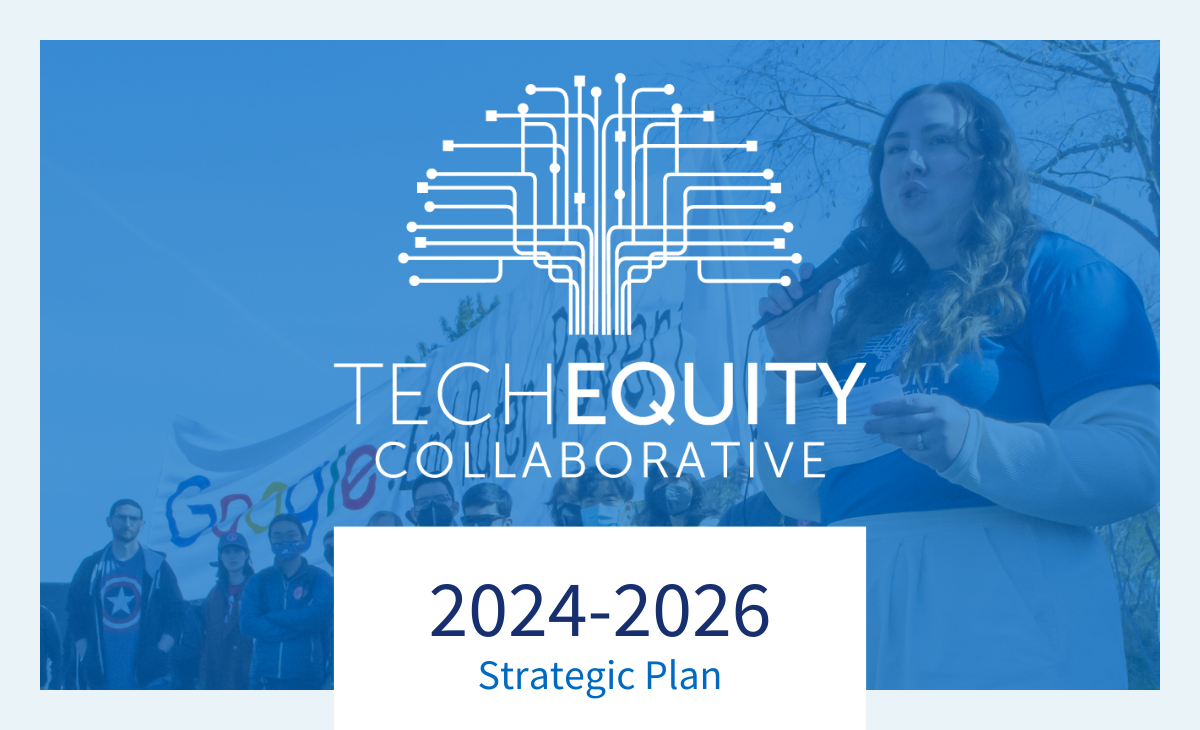
About Us
Our Vision + Mission
We envision a world where the tech industry is responsible for building widespread economic prosperity, and is held accountable for the economic harms it creates in our communities.
Our mission is to raise public consciousness about economic equity issues that result from the tech industry’s products and practices, and advocate for change that ensures tech’s evolution benefits everyone.
How We Work
We conduct original research, collect and amplify the stories of the people impacted by inequitable systems, develop policy and industry recommendations, and focus on the implementation of policies and industry standards to ensure meaningful impact for generations to come.
Our Core Values
Racism is embedded in our economic, political, and social systems. It’s embedded in us all. As we pursue our mission, we practice anti-racism both internally in our organizational practices and externally in our education, our public policy advocacy, and in our industry recommendations. That means being explicit about how racism and racial bias are produced and maintained in our issue areas, and crafting policy solutions that build racial equity in response.
We know that in order to achieve true economic justice and resilience for all, we need bold solutions to our urgent problems. At the same time, our approach to developing these solutions must be grounded in a deep understanding of history and strong trusted relationships with the most impacted communities. We can’t hack our way out of these problems; we need to work together to enact thoughtful, long-term solutions.
We recognize that our organization and much of the tech community come from a place of privilege. We know that we’re working alongside people and communities that have been under-resourced and actively marginalized for decades. We show up conscious of the space we take and use our power to center the voices of those who are closest to the problems.
We see ourselves as adding capacity to existing movements while providing leadership in the spaces where we’re best suited to lead. We believe in the adage “if you want to go fast, go alone; if you want to go far, go together.”
Our policy positions are determined through consultation with our community partners, our expert advisors, impacted people, and our staff. These positions are informed by our research which relies heavily on the lived experiences of the workers and renters who are most directly impacted by the issues we work on.
While we value our institutional funders and the experiences of the industry representatives that we work with, they do not have a say in the development of our policy positions. We engage with companies and industry tables to ensure our recommendations and guidance reflect an understanding of their context, their goals, and their challenges—but we may disagree on key points of policy. We have taken—and will continue to take—publicly divergent stances on key issues. We view our independent, honest, and often contrary voice as a value to the tech industry.
For us, both/and has always been a more powerful perspective than either/or. From our beginning, TechEquity has focused on making connections, building bridges, and staking out common ground that didn’t exist before. This has taken the form of connecting tech workers with their neighbors who are at risk of displacement; anti-displacement advocates with pro-development YIMBYs; and traditional grassroots equity advocates with technology experts.
This belief in connection has led us to evolve into a hybrid organization. We aren’t just one thing: we’re an advocacy organization that also does research, we span the worlds of both tech and economic equity, and we value connection with companies even as we push bold policies to hold them accountable. Our hybrid nature can sometimes cause ambiguity that results in tensions. But we believe that our work is more powerful and effective because of it.
We are a community that appreciates a wide range of perspectives—as long as those perspectives respect everyone’s humanity. We know that we each come into this work from different experiences and that learning from our differences is a generative process.
We strive to create a safe space for learning. That means fostering sometimes-difficult conversations that are always held in good faith and assuming the willingness of participants to reach clarity and understanding, if not consensus.
While charity work has value, it isn’t what we do. Our work focuses on addressing the root causes of inequity, the upstream forces that create the need for charity in the first place. We believe that those root causes are fundamental power imbalances and that in order to achieve our vision, we have to rebalance power through systems change and policy advocacy.
Our Story
TechEquity was founded in 2017 by CEO and Co-Founder Catherine Bracy to answer a simple but ambitious question: what would it take for the growth of the tech industry to benefit everyone?
Tackling that question led us down many paths—some that became obvious very quickly, like the need to address the housing affordability crisis in and around Silicon Valley, and others that emerged as our work progressed, like raising awareness about the hidden inequities within the supply chain of tech’s labor force. In that time, we proudly took on campaigns that address the roots of economic inequality: building and winning historic and first-in-the-nation legislation, developing civic tech tools to empower our communities, and offering comprehensive and practical recommendations to change the tech industry for the better.
We started with tech workers at our core. In late 2016, galvanized by election results in America and the UK, tech workers became newly conscious about their political influence and the responsibility they had for their industry’s behavior. That early work had great success: we mobilized over 7,000 tech workers and added their voices to broader campaigns to address economic inequities in tech’s backyard. That resulted in the passage of landmark legislation that we co-sponsored—the Tenant Protection Act of 2019—which was the single biggest expansion of renter protections in American history.
As Covid lockdowns forced a diffusion of tech workers away from the Bay Area and diverted attention to other more critical needs, we took the time to reflect on our purpose and refocus our attention. This caused us to grapple with economic equity issues that tech was perpetuating not just through their physical presence in our communities, but through their internal practices and the products and services they were releasing into the world.
That work resulted in the development of initiatives to tackle specific economic equity issues we learned about through our early work: the Contract Worker Disparity Project, the Tech, Bias and Housing Initiative, and the Housing Data Initiative. Over the next two years, we plan to launch two new program areas: the Tech, Bias, and Labor Initiative and the Capital Markets Initiative.
The role of tech in the world has never been more consequential. We are facing a global inflection point where societies will decide whether the technologies of the future will enable human flourishing or empower exploitation and division. We know that to build the future we want, organizations like ours need to foster bold and innovative thinking, adopt a strong orientation towards partnership and consensus-building, and pursue a dogged commitment to achieving structural change—and following through on its implementation. Our history demonstrates that we embody all of those things, and we are excited about the role TechEquity will play in creating a future for tech that is more equitable than its past.














